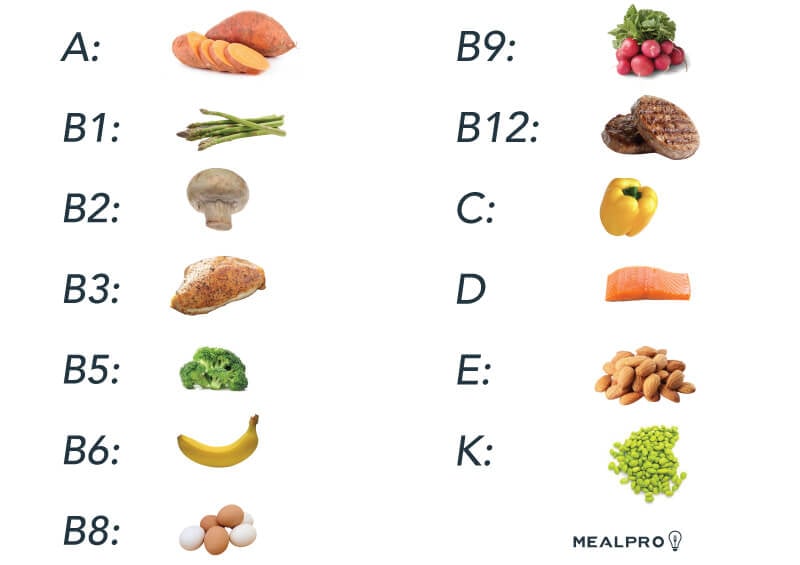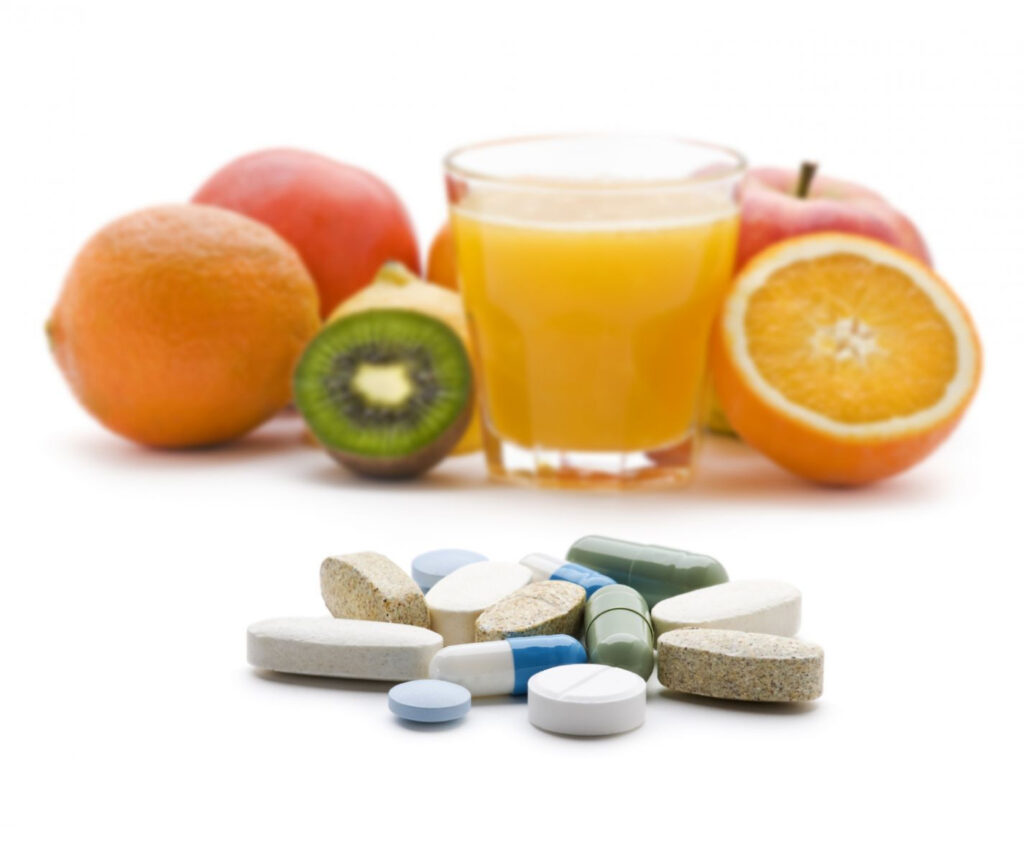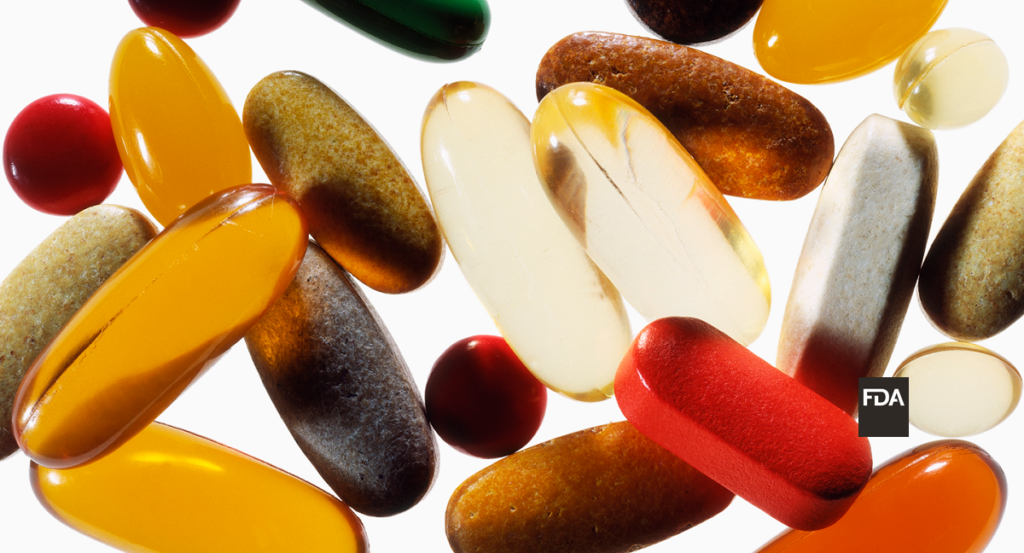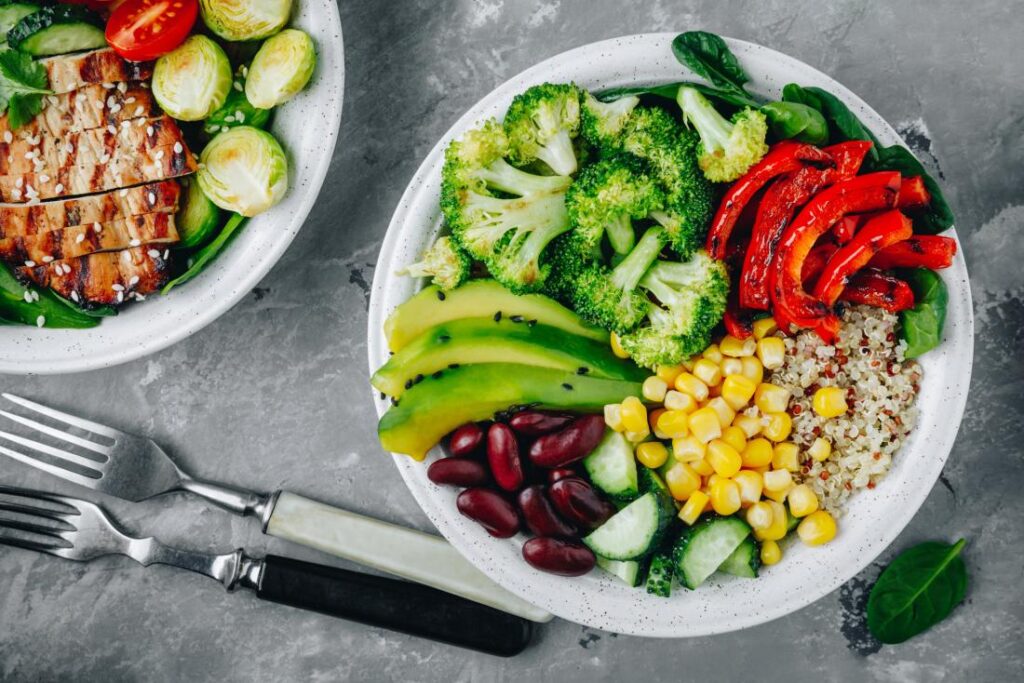In the quest for optimum health and well-being, many people turn to food supplements to bridge the nutritional gaps in their diet. But with a plethora of options available, it can be overwhelming to determine which supplements are truly essential. In this article, we will explore the main food supplements that can provide a variety of health benefits and help you make informed decisions about incorporating them into your daily routine. From vitamins to minerals and herbal extracts, discover the key nutrients that can support your overall wellness and vitality.

This image is property of www.mealpro.net.
Vitamins
Vitamin A
Vitamin A is a fat-soluble vitamin that is essential for various bodily functions. It plays a crucial role in maintaining healthy vision, boosting immune function, and supporting cell growth and development. One of the most important benefits of vitamin A is its role in promoting good eyesight. It helps maintain the health of the cornea, which is the protective outer layer of the eye. Additionally, vitamin A is important for the differentiation and functioning of epithelial cells, which are found in tissues throughout the body.
Vitamin B
The vitamin B complex is made up of eight different vitamins, including B1 (thiamine), B2 (riboflavin), B3 (niacin), B5 (pantothenic acid), B6 (pyridoxine), B7 (biotin), B9 (folate), and B12 (cobalamin). These vitamins are involved in various bodily processes, such as energy production, DNA synthesis, and nervous system function. They are often referred to as “energy vitamins” because they help convert the food we eat into energy that our cells can use. Each vitamin B has its unique benefits and can be found in different food sources.
Vitamin C
Vitamin C, also known as ascorbic acid, is a water-soluble vitamin that is well-known for its powerful antioxidant properties. It plays a crucial role in the production of collagen, a protein that is essential for the health of our skin, bones, and connective tissues. Vitamin C also helps boost the immune system, protect against oxidative stress, promote wound healing, and enhance the absorption of iron from plant-based foods. Citrus fruits, berries, kiwi, and bell peppers are excellent food sources of vitamin C.
Vitamin D
Vitamin D is a unique vitamin because it can be synthesized by the body when the skin is exposed to sunlight. It is also known as the “sunshine vitamin.” Vitamin D plays a crucial role in maintaining strong bones and teeth by enhancing the absorption of calcium and phosphorus. Additionally, it supports immune function and helps regulate mood and cognitive function. Vitamin D deficiency is common, especially in areas with limited sunlight exposure, which is why supplementation is often recommended.
Vitamin E
Vitamin E is a fat-soluble vitamin that acts as a powerful antioxidant in the body. It helps protect cells from damage caused by free radicals, which are unstable molecules that can contribute to the development of chronic diseases, such as heart disease and cancer. Vitamin E also plays a crucial role in immune function, cellular communication, and DNA repair. Nuts, seeds, vegetable oils, and leafy green vegetables are good dietary sources of vitamin E.
Vitamin K
Vitamin K is a crucial nutrient for blood clotting and bone health. It plays a vital role in the synthesis of proteins that are involved in blood clotting, preventing excessive bleeding after an injury. Vitamin K also helps regulate calcium metabolism and supports bone mineralization. There are two main forms of vitamin K: vitamin K1, found in leafy green vegetables, and vitamin K2, produced by gut bacteria and found in fermented foods. Both forms are important for overall health.
Minerals
Calcium
Calcium is a mineral that is essential for building and maintaining strong bones and teeth. It is also involved in muscle contractions, nerve function, and blood clotting. Adequate calcium intake is crucial during childhood and adolescence when bones are growing rapidly. A deficiency in calcium can lead to weak bones and increase the risk of osteoporosis later in life. Dairy products, leafy green vegetables, and fortified foods are excellent sources of calcium.
Iron
Iron is an important mineral that is essential for the production of hemoglobin, a protein that carries oxygen throughout the body. It plays a crucial role in energy production, cell growth, and immune function. Iron deficiency is one of the most common nutrient deficiencies worldwide and can lead to fatigue, weakness, and impaired cognitive function. Red meat, poultry, fish, legumes, and fortified cereals are good sources of iron.
Magnesium
Magnesium is involved in over 300 biochemical reactions in the body and is crucial for nerve and muscle function, blood sugar regulation, blood pressure control, and protein synthesis. It also plays a vital role in maintaining the health of bones and teeth. Magnesium deficiency has been linked to various health conditions, including heart disease, type 2 diabetes, and migraine headaches. Leafy green vegetables, nuts, seeds, and whole grains are excellent sources of magnesium.
Zinc
Zinc is an essential mineral that is involved in numerous enzymatic reactions in the body. It plays a crucial role in immune function, wound healing, DNA synthesis, and cell division. Zinc deficiency can impair immune function, delay wound healing, and affect growth and development. Good food sources of zinc include meat, shellfish, legumes, nuts, and seeds.
Potassium
Potassium is a mineral that is involved in maintaining fluid balance, nerve function, and muscle contractions. It helps regulate blood pressure and keeps the heart, brain, and kidneys functioning properly. Adequate potassium intake is important for overall health, and a deficiency can lead to muscle weakness, fatigue, and an increased risk of hypertension. Bananas, oranges, potatoes, spinach, and beans are good sources of potassium.
Selenium
Selenium is a trace mineral that plays an important role in antioxidant defense and thyroid hormone metabolism. It helps protect cells from damage caused by free radicals and supports the immune system. Selenium deficiency is rare but can occur in areas with low soil selenium levels. Good dietary sources of selenium include Brazil nuts, seafood, meat, eggs, and grains.

This image is property of domf5oio6qrcr.cloudfront.net.
Proteins
Whey Protein
Whey protein is a complete protein that contains all nine essential amino acids. It is a byproduct of cheese production and is quickly absorbed by the body, making it a popular choice among athletes and individuals looking to build or maintain muscle mass. Whey protein is rich in branched-chain amino acids (BCAAs), which are important for muscle recovery and growth.
Casein Protein
Casein protein is another high-quality protein derived from milk. It is digested more slowly than whey protein, providing a sustained release of amino acids into the bloodstream. This makes casein protein ideal for promoting muscle recovery and preventing muscle breakdown during periods of fasting or overnight.
Soy Protein
Soy protein is a plant-based protein that is derived from soybeans. It is a complete protein and an excellent alternative for individuals following a vegetarian or vegan diet. Soy protein has been shown to have various health benefits, including reducing the risk of heart disease, lowering cholesterol levels, and improving bone health.
Pea Protein
Pea protein is a plant-based protein derived from yellow split peas. It is highly digestible and contains all essential amino acids. Pea protein is a popular choice among individuals with allergies or sensitivities to dairy or soy. It has been shown to promote muscle growth, aid in weight management, and support heart health.
Hemp Protein
Hemp protein is derived from the seeds of the hemp plant and is a complete protein that contains all essential amino acids. It is a great source of omega-3 and omega-6 fatty acids and is rich in fiber. Hemp protein is easily digestible and has been shown to have anti-inflammatory properties and support immune health.
Amino Acids
Branched-Chain Amino Acids (BCAAs)
BCAAs, including leucine, isoleucine, and valine, are essential amino acids that play a crucial role in muscle protein synthesis and energy production during exercise. BCAA supplementation is commonly used by athletes and individuals engaging in intense physical activity to support muscle recovery and reduce muscle soreness.
Glutamine
Glutamine is a conditionally essential amino acid that is involved in many physiological processes in the body. It plays a crucial role in muscle recovery, immune function, and gut health. Glutamine supplementation has been shown to improve exercise performance, enhance immune function, and support intestinal health.
Creatine
Creatine is a naturally occurring compound that is found in small amounts in animal products. It is stored in the muscles and used as a source of energy during high-intensity exercise. Creatine supplementation has been shown to increase muscle strength and power, improve exercise performance, and enhance muscle recovery.
L-Arginine
L-arginine is a semi-essential amino acid that is involved in various physiological processes, including protein synthesis, immune function, and vasodilation. It is a precursor to nitric oxide, which helps relax blood vessels and improve blood flow. L-arginine supplementation has been shown to enhance exercise performance, support cardiovascular health, and improve erectile dysfunction.
Beta-Alanine
Beta-alanine is a non-essential amino acid that is converted into carnosine, a compound that helps buffer lactic acid in the muscles during intense exercise. Beta-alanine supplementation has been shown to increase muscular endurance, delay fatigue, and improve exercise performance, particularly during high-intensity, short-duration activities.

This image is property of www.efsa.europa.eu.
Omega-3 Fatty Acids
Fish Oil
Fish oil is a rich source of omega-3 fatty acids, including eicosapentaenoic acid (EPA) and docosahexaenoic acid (DHA). These fatty acids play a crucial role in brain development, reducing inflammation, supporting heart health, and promoting healthy skin. Fish oil supplementation is often recommended for individuals who do not consume enough fatty fish in their diet.
Flaxseed Oil
Flaxseed oil is derived from flaxseeds and is an excellent vegetarian source of omega-3 fatty acids. It is rich in alpha-linolenic acid (ALA), a type of omega-3 fatty acid that is converted into EPA and DHA in the body. Flaxseed oil supplementation has been shown to support heart health, promote healthy skin, and reduce inflammation.
Chia Seeds
Chia seeds are a plant-based source of omega-3 fatty acids, fiber, and various other nutrients. They are rich in ALA and offer similar health benefits as fish oil and flaxseed oil. Chia seeds can be easily incorporated into the diet by adding them to smoothies, yogurt, or oatmeal.
Walnuts
Walnuts are not only a delicious snack but also a good source of omega-3 fatty acids. They contain ALA and offer various health benefits, including supporting brain health, reducing inflammation, and improving heart health. Incorporating walnuts into your diet is as simple as enjoying a handful as a snack or adding them to salads or baked goods.
Hemp Seeds
Hemp seeds are a nutritious powerhouse, rich in omega-3 fatty acids, protein, and fiber. They contain both ALA and the rare omega-6 fatty acid called gamma-linolenic acid (GLA). Hemp seeds can be sprinkled on salads, added to smoothies, or used as a topping for yogurt or oatmeal.
Probiotics
Lactobacillus acidophilus
Lactobacillus acidophilus is a type of bacteria that is naturally found in the human intestines. It is considered a probiotic, which means it helps maintain the balance of beneficial bacteria in the gut. Lactobacillus acidophilus has been shown to support digestive health, boost the immune system, and alleviate symptoms of certain gastrointestinal conditions, such as diarrhea and irritable bowel syndrome (IBS).
Bifidobacterium bifidum
Bifidobacterium bifidum is another probiotic strain that is naturally found in the gastrointestinal tract. It helps promote a healthy balance of gut bacteria and supports digestion and immune function. Bifidobacterium bifidum has been shown to alleviate symptoms of lactose intolerance, support the treatment of diarrhea, and improve symptoms of IBS.
Lactobacillus plantarum
Lactobacillus plantarum is a versatile probiotic strain that is known for its robustness in various environments, including the acidic environment of the stomach. It helps support digestive health, enhance nutrient absorption, and strengthen the immune system. Lactobacillus plantarum has been studied for its potential benefits in reducing symptoms of gastrointestinal conditions, such as inflammatory bowel disease (IBD) and antibiotic-associated diarrhea.
Bifidobacterium longum
Bifidobacterium longum is a probiotic strain that is found in the human gut and plays a crucial role in maintaining intestinal health. It helps support digestion, immune function, and the synthesis of vitamins. Bifidobacterium longum has been studied for its potential benefits in improving symptoms of gastrointestinal conditions, such as ulcerative colitis and constipation.
Saccharomyces boulardii
Saccharomyces boulardii is a probiotic yeast strain that has unique properties and benefits. It has been extensively studied for its potential to prevent and treat gastrointestinal infections, such as traveler’s diarrhea and Clostridium difficile (C. diff) infection. Saccharomyces boulardii has also been shown to support digestive health and reduce symptoms of conditions like IBS.

This image is property of www.fda.gov.
Herbal Supplements
Ginseng
Ginseng is a popular herbal supplement that has been used for centuries in traditional medicine. It is known for its adaptogenic properties, which means it helps the body adapt to stress and promote overall well-being. Ginseng has been studied for its potential benefits in improving cognitive function, reducing fatigue, and enhancing immune function.
Ginkgo Biloba
Ginkgo biloba is derived from the leaves of the ginkgo tree and has long been used in traditional medicine. It is known for its potential benefits in improving cognitive function, enhancing memory, and reducing symptoms of anxiety and depression. Ginkgo biloba has antioxidant properties and helps improve blood circulation, which is important for overall brain health.
Echinacea
Echinacea is a flowering plant that has been used in traditional medicine to boost the immune system and alleviate symptoms of the common cold and other respiratory infections. It is known for its anti-inflammatory and antimicrobial properties and is often used as a natural remedy to support immune health.
Garlic
Garlic is not only a delicious ingredient but also a powerful herbal supplement. It has been used for centuries in traditional medicine for its potential benefits in boosting the immune system, supporting cardiovascular health, and reducing blood pressure and cholesterol levels. Garlic has antimicrobial, anti-inflammatory, and antioxidant properties.
Milk Thistle
Milk thistle is a flowering herb that has been used for centuries for its potential benefits in liver health. It contains a compound called silymarin, which has antioxidant and anti-inflammatory properties. Milk thistle has been shown to support liver function, protect against liver damage, and aid in the detoxification process.
Antioxidants
Vitamin E
Vitamin E is a powerful antioxidant that helps protect cells from damage caused by free radicals. It plays a crucial role in maintaining healthy skin, boosting immune function, and supporting cardiovascular health. Vitamin E can be found in various foods, such as nuts, seeds, vegetable oils, and leafy green vegetables.
Vitamin C
Vitamin C is another potent antioxidant that helps protect cells from oxidative damage. It plays a crucial role in collagen synthesis, immune function, and wound healing. Vitamin C is found in abundance in citrus fruits, berries, kiwi, and bell peppers.
Beta-Carotene
Beta-carotene is a precursor to vitamin A and a powerful antioxidant. It helps protect cells from damage caused by free radicals and supports healthy vision, skin, and immune function. Beta-carotene is found in colorful fruits and vegetables, such as carrots, sweet potatoes, spinach, and bell peppers.
Selenium
Selenium is a trace mineral that acts as an antioxidant in the body. It works in conjunction with other antioxidants to protect cells from oxidative damage and support immune function. Selenium can be found in Brazil nuts, seafood, meat, eggs, and grains.
Coenzyme Q10
Coenzyme Q10 (CoQ10) is a naturally occurring antioxidant that is found in every cell of the body. It plays a crucial role in energy production, supports cardiovascular health, and protects cells from oxidative damage. CoQ10 levels decrease with age, and supplementation may be beneficial, especially for individuals with heart disease or other chronic conditions.

This image is property of cdn-prod.medicalnewstoday.com.
Fiber
Psyllium Husk
Psyllium husk is a type of soluble fiber that is derived from the seed husks of the Plantago ovata plant. It absorbs water in the digestive tract, forming a gel-like substance that promotes regular bowel movements and helps relieve constipation. Psyllium husk has also been shown to lower cholesterol levels and improve blood sugar control.
Chia Seeds
Chia seeds are rich in both soluble and insoluble fiber. They absorb liquid and form a gel-like substance in the digestive tract, promoting a feeling of fullness and aiding in weight management. Chia seeds are also a good source of omega-3 fatty acids and offer additional health benefits, such as reducing inflammation and improving heart health.
Flaxseeds
Flaxseeds are an excellent source of dietary fiber, including both soluble and insoluble fiber. They can help regulate bowel movements, reduce constipation, and promote a healthy digestive system. Flaxseeds also contain omega-3 fatty acids and lignans, which have been shown to have various health benefits, including reducing inflammation, improving heart health, and supporting hormone balance.
Oat Bran
Oat bran is the outer layer of the oat grain and is a rich source of soluble fiber. It helps lower cholesterol levels, regulate blood sugar levels, and promote a healthy digestive system. Oat bran is often used as a dietary supplement and can be easily incorporated into the diet by adding it to oatmeal, smoothies, or baked goods.
Legumes
Legumes, such as beans, lentils, and chickpeas, are excellent sources of dietary fiber. They are rich in both soluble and insoluble fiber, which helps promote digestion, regulate blood sugar levels, and support weight management. Legumes are also a good source of plant-based protein and offer various health benefits, including reducing the risk of heart disease and improving gut health.
Digestive Enzymes
Amylase
Amylase is an enzyme that breaks down carbohydrates, such as starch and glycogen, into smaller sugar molecules that can be easily absorbed by the body. It is produced by the salivary glands and pancreas and plays a crucial role in the digestion and absorption of carbohydrates.
Lipase
Lipase is an enzyme that helps break down fats or lipids into smaller molecules, such as fatty acids and glycerol, which can be absorbed by the body. It is produced by the pancreas and plays a crucial role in the digestion and absorption of dietary fats.
Protease
Protease is an enzyme that helps break down proteins into smaller peptides and amino acids, which can be absorbed by the body. It is produced by the stomach, pancreas, and small intestine and plays a crucial role in the digestion and absorption of dietary proteins.
Cellulase
Cellulase is an enzyme that helps break down cellulose, a complex carbohydrate found in plant cell walls. Humans do not produce cellulase, but it can be obtained from certain bacteria or fungi. Cellulase supplementation may be beneficial for individuals who have difficulty digesting high-fiber foods, such as fruits, vegetables, and whole grains.
Lactase
Lactase is an enzyme that helps break down lactose, the sugar found in milk and dairy products. It is produced by the cells lining the small intestine and plays a crucial role in the digestion and absorption of lactose. Lactase deficiency can lead to lactose intolerance, characterized by digestive symptoms such as gas, bloating, and diarrhea. Lactase supplementation can help individuals with lactose intolerance enjoy dairy products without discomfort.
In conclusion, food supplements provide a convenient way to ensure that your body receives essential vitamins, minerals, proteins, amino acids, omega-3 fatty acids, probiotics, herbal supplements, antioxidants, fiber, and digestive enzymes. Whether it’s supporting your immune system, promoting healthy digestion, improving exercise performance, or maintaining overall well-being, incorporating food supplements into your daily routine can help bridge any nutritional gaps and support optimal health. Remember to consult with a healthcare professional before starting any new supplement regimen.
